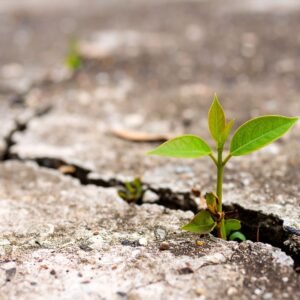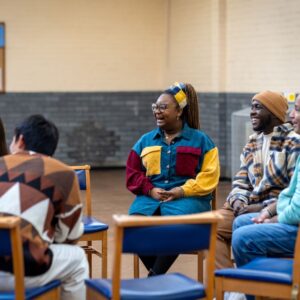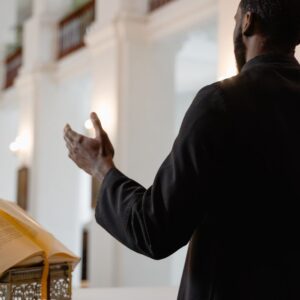– Stephen A Macchia, Crafting a Rule of Life
We are all shaped by customs, routines, and habits.
Growing up Roman Catholic, I was formed by the customs, routines, and habits of the church—attending Mass, receiving Eucharist, caring for the poor. These practices possess an interior, unspoken code, an embodied knowledge that influences and informs our cerebral efforts. It’s this formation — of our conscious and unconscious, of our imaginations and our emotions — that make practices matter so deeply.
As a young person, I often prayed the rosary. For those not familiar, the rosary is a prayer practice that uses a string of beads that are guided through one’s hands. Each bead represents a prayer to recite, one of those being the Hail Mary: Hail Mary, full of grace, have mercy on us now and in the hour of our death.
A few days before Thanksgiving, I received word that my cousin, who is just one year older than I, had contracted Covid-19. The disease had progressed, and she was in the intensive care unit. For the next five nights, in my dreams, I found myself reciting the familiar words of the Hail Mary, feeling the rosary beads pass through my fingers.
I have not prayed the Hail Mary in over three decades, with the occasional exception of attending a relative’s funeral. It had been so formed in me that as an adult, under so much anxiety over my cousin’s condition, I prayed a prayer I had prayed almost daily from childhood to my late teens.
The practices of my young self formed me and cared for me in this season of need.
The words and ritual of praying the rosary were so integrated that they were readily present to me, even in my subconscious self. The behaviors we practice ritualistically, routinely, repeatedly have this kind of power: they shape us in our most interior places.
What I practice — my “Way of Life” — is important not only because it cares for me right now, to address the stress and needs of this moment, but also because it supports my long-term wellbeing.
The practices of my youth are caring for me now, all these years later, in ways that I find surprising and comforting. My practices today will care for my future self in ways I can’t now anticipate.
Developing your Way of Life
In our work around resilience, we discuss, discern, and develop our Way of Life, rooted in the Benedictine Rule of Life. A Way of Life is a commitment to live in particular ways, crafted with prayer and discernment, as a way to become the person God created you to be.
These practices are not goals or resolutions to achieve, but practices to become a whole human person. The goal is not to live it perfectly, but to live more faithfully: aware and attuned to the present moment of life.
The questions that the angel asks Hagar when she’s in the desert connect the past and the future into the present moment: Where are you going? Where have you been? It’s difficult to know where you’re going when you don’t have a sense of where you have been; the look back informs how we look forward, and in which direction we choose to make our path.
The Way of Life is designed to help us focus on where we’ve been, and to discover where we are, and to discern our way forward.
Through this exercise, we hope to have a sustainable Way of Life that is not about legalism, but life-giving practices, rhythms, and habits that ground us in the present. Spending time reflecting on our current Way of Life keeps us present in the present moment. It helps us to craft our life through crafting each day.
Last week, the alumni community of Resilient Leaders gathered to reexamine our ways of life.
We revisited our priorities, reexamined our practices, and reawakened to the patterns we live — whether intentionally crafted or habitual. Regularly gathering our community of alumni is a practice that decreases pastoral isolation, increases connection to a community of support and encouragement and energizes these leaders to live out their way of life.
As staff for the Certificate in Resilient Service, I’ve been creating my Way of Life alongside the ministry leaders for the past few years. I notice that I have primarily needed to focus on the physical and emotional realms of my practices, as they have been the most challenging for me and my wellbeing.
Not being in touch with my emotional health leads to coping mechanisms that numb me instead of care for me, which then leads to negative self-talk and self-contempt. Through regularly reflecting on my current Way of Life at these regular intervals, I see the impact of stress and embedded patterns that I don’t want for myself, but fall into — negative self-talk, feeling condemnation about not moving my body, gaining weight which puts stress on my heart.
This year, in light of the stresses and uncertainty in different realms of my life, I have sensed the invitation to begin my day in silence, a posture of “being” in the presence of the Divine Love that has formed me throughout my life.
A strong value of the team of Resilient Leaders Project is that we aren’t experts at being human; we journey alongside participants, share what we’ve learned about ourselves and our resilience, and continue to learn and grow from these relationships.
The rhythms of the alumni community have become a place to continue those conversations, and continually reorient myself towards wellness and life abundant. Intentionally taking time with myself and others to refresh my Way of Life I have committed to is a practice that reminds me of the words of St Benedict: “Always begin again.”
If you, like me, would benefit from a community of support to inquire about your wellbeing with curiosity, care, and compassion, you’re invited to join us. A Resilience Circle offers a unique, transformative journey of personal growth, connection, and understanding resilience. Learn more about resilience circles here.
Or if you are looking for something different, browse all our offerings.










0 Comments